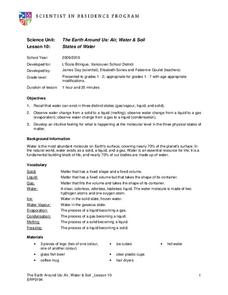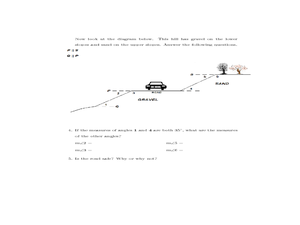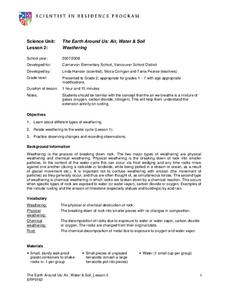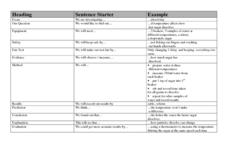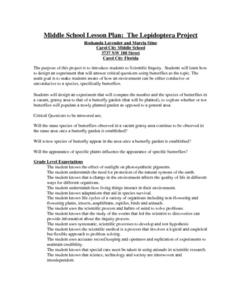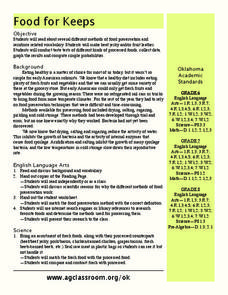Curated OER
States of Water
Students investigate the 3 states of matter. In this physical science "matter" lesson plan, students observe and participate in a number of demonstrations involving melting and freezing water. Students observe the effect heat has on...
Curated OER
The Tipping Point
Students rewrite word problems and solve using math. In this word problem lesson plan, students gather data and observe the data. They relate this process to the scientific method and math. They review their data to be able to answer...
Curated OER
Earth System Science
Students investigate the age of the earth by using accepted scientific methods. They conduct research about the use of radioactive dating and there is a simulation activity of the process. Finally, students measure the radioactive decay...
Curated OER
Air Is there
Young scholars experiment to observe air and its mass. In this air lesson, students use the scientific method to complete experiments that demonstrate the properties of air. Young scholars view a video as follow-up.
Curated OER
Characteristics of Living Things
Student use the scientific method to experiment with worms. In this characteristics of living things lesson, students predict and examine the reactions of worms to dry and wet soil. Students share their findings.
Curated OER
Observing Reactions
Young scholars use the scientific method to complete to experiments that have visible reactions. In this visible reaction lesson, students participate in an experiment with melting ice and one with inflating a balloon. Young scholars...
Curated OER
Weathering
Second graders explore weathering and how the water cycle plays a part in weathering. For this weathering lesson, 2nd graders put gravel and sugar cubes in a jar and shake, simulating weathering. Students use the scientific method...
Curated OER
Fact vs. Opinion: Theory, Hypothesis, and Bias
Emphasize the differences between a theory and a hypothesis to teach your class how to avoid scientific bias.
Curated OER
Summer Science Recipes: Experiments on the Grill and in the Kitchen
Generate ideas about the most scientifically sound ways to prepare foods safely and efficiently during the summer season. Learners will use the GED Connection Science Workbook, so they can practice the skills needed to prepare for the...
Chicago Botanic Garden
Historical Climate Cycles
What better way to make predictions about future weather and climate patterns than with actual climate data from the past? Young climatologists analyze data from 400,000 to 10,000 years ago to determine if climate has changed over...
Curated OER
Designing a Crew Exploration Vehicle
Take your class on an out-of-this-world adventure with this fun engineering design lesson. Working in small groups, young scientists design, build, and test crew exploration vehicles using some creativity, teamwork, and...
Curated OER
The Process of Art Criticism
High schoolers interpret possible meanings of works of art by analyzing how specific works are created and how they relate to historical and cultural contexts
Compassion in World Farming Trust
Selective Breeding of Farm Animals
Biology learners read about selective breeding in chickens and how it has produced high-yield meat specimens and rapid egg-layers. The unpleasant effects of artificial selection are explored, as well as options to supporting this...
Teaching Ideas
Investigation Prompts
Get your class started with experimentation and investigation by providing sentence starters. This chart is made up of three columns. The first column lists steps of the scientific process and the second provides sentence starters for...
Curated OER
Social Studies: Cooking Methods - Past and Present
Fourth graders identify geographic regions (Texas' Edwards Plateau) and sequence steps in the hot rock cooking process. They compare and contrast prehistoric and contemporary cooking methods. Students conduct online research and record...
Curated OER
Centrifugal Force and Mandy Sue Day
Fourth graders explore the story Mandy Sue Day and investigate centrifugal force. They demonstrate the concept of centrifugal force, use analytical thinking and they conduct an experiment using centrifugal force. Students discuss the...
Curated OER
Testing Weather Proverbs
Students study weather proverbs. In this weather lesson, students list weather proverbs and complete the worksheet to test the proverb. Students design an experiment to test the weather proverbs and conduct the experiments.
Curated OER
Emulsion_ Compulsion
Students experiment with common household products to determine the properties of emulsions and how they fit into the classifications of matter through this series of lessons.
Curated OER
Creating a Salad Dressing
Students investigate how the scientific process can be applied to making a new salad dressing recipe.
Curated OER
Forming a Hypothesis
In this hypothesis worksheet, students read about how to form a hypothesis and how to collect observations. Students go through the 4 steps of forming a hypothesis.
Curated OER
The Lepidoptera Project
Students are introduced to Scientific Inquiry and discover how to design an experiment that answers critical questions using butterflies as the topic. They design experiments that compare the number of species of butterflies in a vacant,...
Kenan Fellows
The Effects of Environmental Conditions on Aquatic Organisms
What kind of experiment can your class do to how observe the environment effects on organisms? Groups design and conduct lab experiments to learn about the effects of the environment on aquatic organisms. Based upon knowledge gained...
Beyond Benign
12 Principle Match Up
Can you find a match? Scholars review the 12 principles of green chemistry by playing a matching game. The second lesson plan of the series reinforces the principles from the first lesson plan. Individuals play the matching game and also...
Curated OER
Food For Keeps
Students explore food. In this processed and fresh foods lesson, students discover how some foods are processed and how they differ from fresh food. The complete group activities and an individual reading assignment. This lesson includes...
